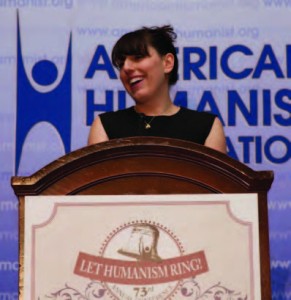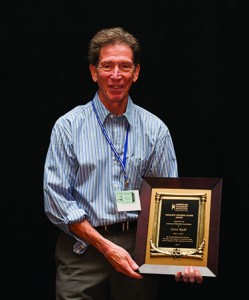Excerpts from Awardees Jessica Valenti and Steve Rade

Jessica Valenti,
2014 Humanist Heroine
Jessica Valenti is the founder of the influential feminist website, Feministing, and the author of four books on feminism, politics, and culture: Full Frontal Feminism (2007); He’s a Stud, She’s a Slut (2008); The Purity Myth (2009), which was made into a documentary; and Why Have Kids? (2012). She edited the 2008 anthology, Yes Means Yes!: Visions of Female Sexual Power and a World Without Rape, and her astute and acerbic commentary appears regularly in numerous major publications. A widely sought-after speaker and frequent media commentator, Valenti was named one of the “Top 100 Women” in 2011 by the Guardian, for which she now writes a regular column. Jessica Valenti was named the 2014 Humanist Heroine by the Feminist Caucus of the American Humanist Association. The following excerpts are from her remarks in accepting the award on June 7, 2014, at the AHA’s 73rd Annual Conference.
“What an extraordinary time it is to be a feminist. Because we’re at a bizarre and fascinating moment in this country where there’s both widespread cultural acceptance of feminism but also a shocking and hostile disdain for women.”
“Despite the fact that we made birth control legal decades ago, there is somehow, bafflingly, an argument over whether or not contraception is part of women’s healthcare or just a license for girls to get slutty. I think it can be both, and I’m alright with that.”
“Abstinence-only education sends this message that men are sexual animals; that they can’t control themselves; that all they want is sex. And I think that’s a really limiting and damaging view for young men, especially when they’re getting so many similar messages in pop culture.”
“One in four women in America will experience domestic violence and 40 percent of female murder victims in America are killed by a current or former partner.… A sixteen-year-old woman in Connecticut was stabbed to death by a classmate after she turned down his prom invitation. Women turning down men’s advances has become like a game of Russian roulette.”
“If we’re completely unwilling to name misogyny when it’s explicit and violent and obvious how will we ever stop it when it’s hidden and insidious, which it so often is? I don’t accept that in a country of people who are, at their core, good and caring and just, that we can turn our heads from the epidemic of hate on our doorstep. And I believe that part of the reason that we’re seeing this surge of cultural acceptance of feminism is that we’re nearing a critical mass of people who recognize that sexism is a national sickness.
“I hear this a lot—how dare you talk about sexism in America when women across the globe are being stoned to death or systematically raped or oppressed in other ways. As if fighting against oppression is a zero-sum game and you can only do it one country at a time.”
“We can ask our sons: When did you feel like a man? We can ask our daughters: What makes you feel like a woman? I think encouraging that sort of self-reflection and critical thinking in our kids is the best way.”
 Steve Rade,
Steve Rade,
2014 Humanist Business Award
Steve Rade is the cofounder, with his wife Susan, of Wireless Xcessories Group, a nationwide distributor of cellphone accessories. He has been an active secular humanist since 1995 when he helped organize the Philadelphia Association for Critical Thinking (PHACT). He has also been a benefactor to the American Humanist Association, the Center for Inquiry, and the Secular Coalition for America and was a major funder of the 2012 Reason Rally in Washington, DC. In 2008 he founded the Philadelphia Coalition of Reason, dubbed PhillyCoR, and a year later launched the United Coalition of Reason (UnitedCoR) with affiliates in close to eighty cities nationwide. Now with some eight more affiliates in development, UnitedCoR aims to help local nontheistic groups work together to achieve higher visibility, gain more members, and have a greater impact in their local areas. Steve Rade was presented with the Humanist Business Award at the American Humanist Association’s 73rd Annual Conference in Philadelphia, Pennsylvania, on June 7, 2014. The following excerpts were adapted from his remarks in acceptance of the award.
“Back in 2009 some people asked whether the secular movement needed another group. We had the Center for Inquiry, the Council for Secular Humanism, the American Humanist Association, American Atheists, the Freedom From Religion Foundation, and many more. Well, the answer to the question was that all these groups were like islands in an ocean… With all the different groups and the variety of identifying labels, the secular movement had no critical mass, no unified voice, and there was no public awareness of who we were. So it became obvious to me that the way to get people together was to form local coalitions. There is obviously strength in numbers and, let’s face it, coalitions have much more political clout. So I became passionate about building a coalition and I still remain committed to this cause.”
“UnitedCoR for me became a springboard for a bunch of new secular programs that I’ve become happily involved with. Indeed, the secular community is no longer the silent minority it once was. There’s Recovering from Religion, which has developed a method of linking callers who are looking to escape from their former religious beliefs and hook up with volunteer phone counselors from around the country. American Atheists has a program to install benches in public spaces where there is a Jesus statue or some other religious symbol. Also, American Atheists has just come out with a streaming TV channel and is going to allow all groups within our movement to contribute content. And you probably know about the Freedom From Religion Foundation airing spot commercials featuring Ron Reagan Jr. These are the kind of big ideas that need big funders.”
“I’m getting an award for businessperson of the year, and I think the word “businessperson” is a little generic. I look at myself as an entrepreneur. Entrepreneurs are people who want to build things. They want to see things happen. They want to know that there’s a program they can endorse and become part of that has a beginning, middle, and end, and that makes measurable progress.”
“We as a group are known by so many different names. … Even though we might not all explain it the same way, we’re all humanists here.”
